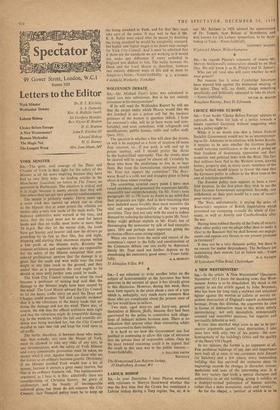Letters to the Editor
York Minster Dr. R. L. Kitching Wolfenden Debate A. A. Dumont,
Rev. A. Hallidie Smith
Labour Bishop Sir Geoffrey Mander,
Rev. Victor H. Beaton
Choice Before Europe H. G. Watson A New Westminster? John F. Fitchen III Roman Methodist Edward Bishop The Magic Net H. G. Harney The Longest Word Mrs. lean Mann, MP YORK MINSTER SIR,—The quiet, cool courage of the Dean and Chapter of York in their fight for the safety of the
Minster is all the more inspiring because they have
had so very little help : no leading articles in the Manchester Guardian; no letters in The Tittles; no
questions in Parliament. The situation is critical and it is tragic because it seems certain that they will lose unless they can get very powerful reinforcements. The matter is perfectly simple. Thirty years ago a main road was opened up which ran so .close
to the Minster that at some points the vehicles are within only a very few yards of the main walls. The highway authorities were warned at the time, and since, that the road must not be used for heavy loads and that no traffic must move at more than 10 m.p.h. But they let the matter slide, the loads have got heavier and heavier and now the drivers go pounding by as fast as they like, day and night, stopping and starting their enormous engines within a few yards of the Minster walls. Recently the eminent architects and engineers who are responsible for the safety of the Minster submitted their con- sidered professional opinion that the damage is so great that the south and west walls near the road might at any time crash to the ground, and they added that as a precaution the road ought to be closed at once until further tests could be made.
The York City Council refused to close the road because a professor of mining had said that the damage to the Minster might have been caused by the wind ! The Lord Mayor advised the City Council to let the heavy traffic carry on until the Dean and Chapter could produce 'full and scientific evidence' that it is the vibrations of the heavy loads that are doing the damage and not the wind. There was, of course, the risk that the official architects were right and that the vibrations might do irreparable damage, e.g. to the windows, whilst the full and scientific evi- dence was being searched for, but the City Council decided to take that risk and keep the road open to all traffic.
The battle, therefore, is between those who main- tain that nobody, not even the Mayor of York, must be allowed to take any risks of any sort, in any circumstances, with the safety of York Minster and every conceivable precaution must be taken, no matter what it cost. Against them are those'who see the matter as an ordinary business gamble. Obviously; if the Minster crashed York would lose a lot of money, because it attracts a great many tourists, but that is an ordinary business risk. The businessman's argument, as I hear it, is this : admittedly there are considerations of Christian history, the glory of architecture and the beauty of incomparable coloured glass, but those do not concern the City Council; their financial policy must be to keep up the living standard in York, and for that they must take care of the pence. It may well be that if Mr. R. A. Butler were asked what he meant by doubling the living standard he would be completely stumped, but higher and higher wages is no doubt near enough for York City Council. And it must be admitted that if those are the standards we are working to it would not make any difference if every cathedral in England was shaken to bits. The battle between the Dean and the Lord Mayor is, therefore, between two entirely different ways of life and so must be fought to a finish.—Yours faithfully, 4 Ashfield, Wetherby, Yorkshire R. L. KITCIIING


























 Previous page
Previous page